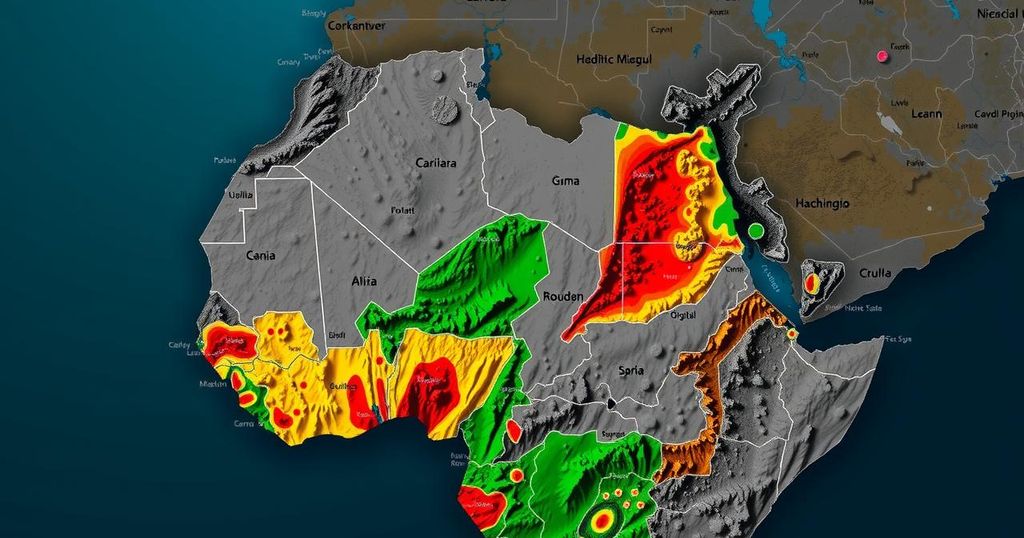The Republic of Congo seeks to diversify its economy by increasing investment in the development minerals sector. This untapped industry, comprising industrial and construction materials, has significant potential to enhance GDP and support infrastructure development. Major projects, including the Sounda Dam and various rail and port initiatives, further underscore the country’s strategic direction aimed at fostering economic growth and sustainable practices in the mining industry.
The Republic of Congo is strategically focusing on diversifying its economy to reduce dependence on oil by promoting investment in the mining sector, particularly in development minerals, which include essential industrial and construction materials. These resources possess vast potential to bolster infrastructure projects and, with well-structured management, could substantially contribute to the nation’s GDP, stimulate sustainable economic growth, and enhance the overall mining industry.
Despite showing immense potential, the artisanal production of development minerals in Congo remains largely untapped. A 2024 baseline study conducted by the Congolese government in collaboration with the UN Development Program (UNDP) reveals that the production of sand and rubble stands at 113,498m³ and 86,984m³ respectively, which does not reflect the full economic contribution these resources could make to the GDP. This gap indicates significant strategic opportunities for investment in this sector.
The role of development minerals such as sand, stone, and gravel is pivotal for infrastructure projects, acting as foundational materials for roads, bridges, and public facilities. Furthermore, these minerals are critical in supporting the energy sector through facilitating construction and transportation. The Congolese government is prioritizing the revitalization of the energy sector with major projects, including the €2 billion Sounda Dam expected to generate between 600 MW and 800 MW of electricity, and the €150 million port project to promote industrial activity in the Pointe-Noire SEZ.
In collaboration with the Democratic Republic of Congo, plans for a railway bridge connecting Brazzaville and Kinshasa are set to commence, anticipated to handle more than 5 million passengers and 3 million tons of goods annually. Additionally, a recent agreement with Russia for an oil pipeline construction further emphasizes the strategic initiatives underway. By enhancing the structured production of development minerals and modernizing artisanal operations, the country can significantly lower infrastructure costs while fostering sustainable practices.
Moreover, the Republic of Congo is endowed with rich mining resources beyond development minerals, such as iron ore, copper, gold, and potash. Noteworthy projects, including the Mbalam-Nabeba and Mayoko iron ore initiatives, underline the promising outlook of the mining sector. The Zanaga project, aiming to produce 30 million tons of iron ore annually, highlights further opportunities for growth.
The upcoming Congo Energy & Investment Forum scheduled for March 25-26 in Brazzaville is poised to be a pivotal platform for stakeholders seeking collaboration and investment in both the infrastructure and mining sectors. This forum aims to solidify Congo’s position as a crucial agent of Africa’s economic transformation, illustrating the country’s commitment to sustainable development and diversification of its economy.
The Republic of Congo is actively pursuing economic diversification to mitigate its reliance on the oil sector. The development minerals industry, encompassing vital resources for construction and industrial use, presents substantial opportunities for economic enhancement. The government, in collaboration with international partners, is exploring ways to utilize these untapped resources to spur economic growth and develop infrastructural capabilities while promoting sustainable practices within the mining sector.
In conclusion, the Republic of Congo stands at a critical juncture where strategic investment in the development minerals sector can unlock significant economic potential. By modernizing production practices and enhancing infrastructure capabilities, the country not only aims to lower costs but also to catalyze broader economic growth and development. Participation in upcoming investment forums will further solidify Congo’s role in driving economic transformation across Africa.
Original Source: energycapitalpower.com






